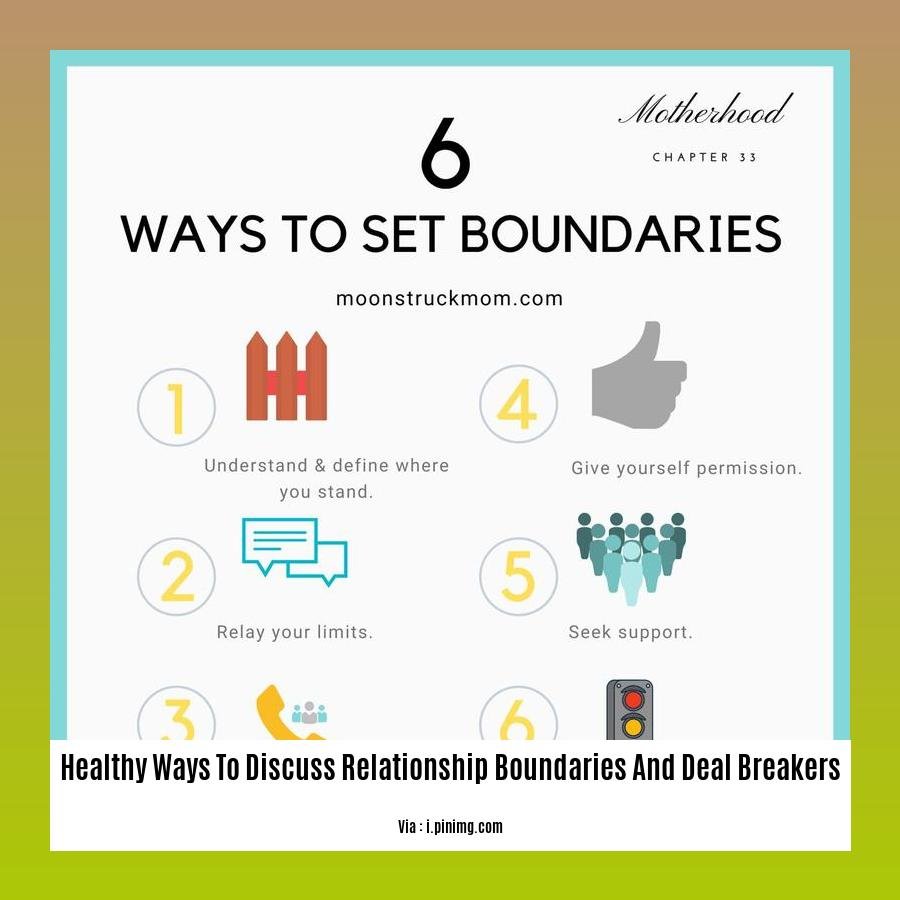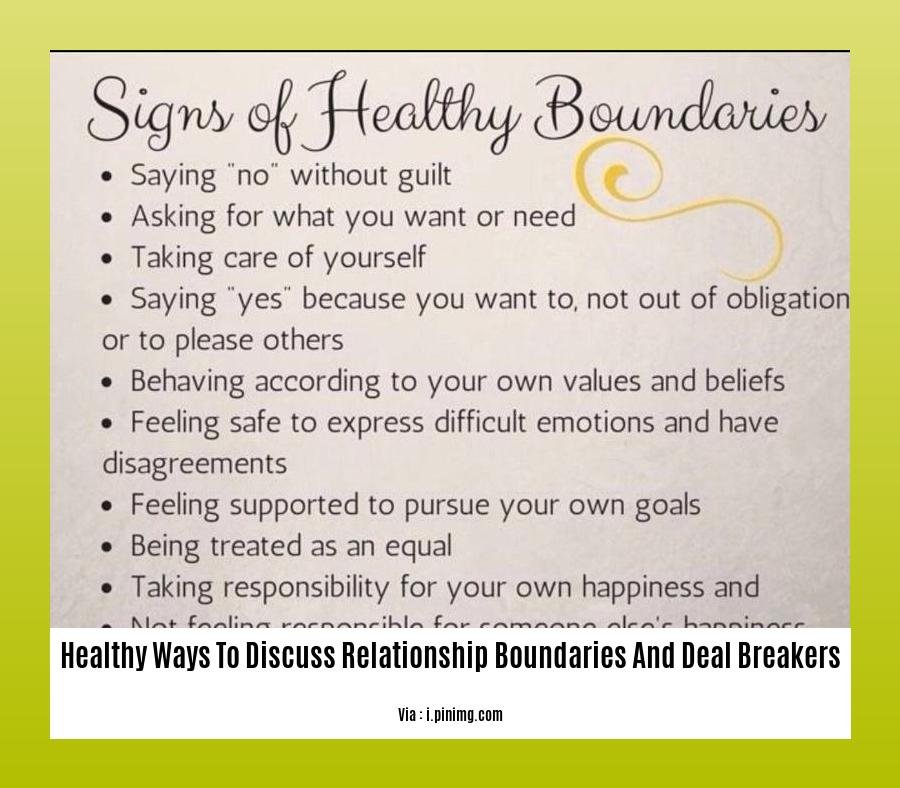Navigating relationship boundaries and deal-breakers can be challenging, but open and honest communication is key. [Healthy Ways to Discuss Relationship Boundaries and Deal-Breakers] explores effective strategies for fostering healthy discussions, promoting understanding, and creating stronger connections.
Key Takeaways:

- Protect yourself: Boundaries safeguard your safety and well-being.
- Build trust and respect: Clear boundaries foster trust and respect within a relationship.
- Communicate effectively: Talk openly about your boundaries to avoid misunderstandings.
- Know your deal-breakers: Identify the non-negotiable limits that could end the relationship.
- Prioritize emotional needs: Protect your emotional well-being and boundaries.
- Be specific and direct: Use clear and direct language when setting boundaries.
- Enforce consistently: Stand up for your boundaries and enforce them assertively.
Healthy Ways to Discuss Relationship Boundaries and Deal-Breakers
Discussing relationship boundaries and deal-breakers can be challenging, yet it’s crucial for maintaining healthy and fulfilling partnerships. Here’s a practical guide to help you navigate these discussions effectively:
Communicate Openly and Honestly
- Choose a private and comfortable setting where you can talk openly without distractions.
- Use “I” statements to express your feelings and needs, avoiding blame or accusations.
- Listen attentively to your partner’s perspective and try to understand their unique boundaries.
- Be willing to compromise when possible, recognizing that boundaries are not always absolute.
Identify and Respect Deal-Breakers
- Deal-breakers are non-negotiable limits that, if crossed, could end the relationship.
- Discuss deal-breakers early on to avoid misunderstandings and disappointment.
- Be clear and specific about what behaviors or situations constitute deal-breakers for you.
- Respect your partner’s deal-breakers and avoid pressuring them to compromise.
Prioritize Emotional Needs
- Healthy boundaries protect your emotional well-being.
- Be assertive in expressing your needs and expectations.
- Don’t allow others to violate your boundaries or make you feel uncomfortable.
- Take breaks or end conversations if discussions become heated or disrespectful.
Maintain Consistency and Enforce Boundaries
- Once boundaries are established, enforce them consistently.
- Let your partner know that you take your boundaries seriously and expect them to be respected.
- If boundaries are violated, communicate the consequences and be prepared to follow through.
- Remember that setting and enforcing boundaries is an ongoing process. Communicate regularly to ensure that both partners are adhering to them.
By following these healthy ways to discuss relationship boundaries and deal-breakers, you can create a foundation of trust, respect, and mutual understanding in your relationship. Open and honest communication is the key to navigating these sensitive topics and fostering a healthy and fulfilling partnership.
Want to express your needs and set healthy boundaries in your relationship? Look no further than our comprehensive guide on communicating needs and boundaries in a relationship. Learn how to assertively and clearly convey your wants and limits through our step-by-step guide on steps to assertively express your wants and limits with your partner. Master the art of effectively communicating your needs and expectations with our ultimate resource on guide to clearly conveying your needs and expectations in relationships.
Listen Actively and Seek to Understand
When navigating delicate discussions surrounding relationship boundaries and deal-breakers, the key to navigating these conversations with empathy and clarity lies in actively listening and seeking to understand your partner’s perspective.
Key Takeaways:
- Choose a private setting: Create a safe and comfortable space for open communication.
- Use “I” statements: Express your thoughts and feelings without blaming or accusing your partner.
- Listen attentively: Pay undivided attention to what your partner has to say without interrupting or dismissing their views.
- Summarize to ensure understanding: Restate what you’ve heard to show you’ve listened and understood their point of view.
By practicing active listening, you foster a stronger connection, demonstrate respect for your partner’s emotions, and create a foundation for constructive dialogue. Remember, it’s not just about hearing the words but truly understanding the underlying meaning and intent.
Citation: HelpGuide.org: Setting Healthy Boundaries in Relationships
Be Willing to Compromise and Negotiate
Forging fulfilling relationships requires the delicate dance of understanding and respecting boundaries while navigating inevitable differences. The key lies in being willing to compromise and negotiate.
Key Takeaways:
- Open Communication: Discuss your values, needs, and deal-breakers early on to establish a solid foundation.
- Boundaries: Identify your non-negotiables and communicate them clearly. Respect your partner’s boundaries as well.
- Compromise: Find areas where you can meet halfway, considering your partner’s perspective and your own.
- Negotiation: Engage in respectful dialogue to find solutions that work for both parties.
Remember, relationships are not one-sided endeavors. It’s a process of give and take, where both partners have the willingness to compromise and negotiate for a harmonious partnership.
Reference:
- MindBodyGreen:
Respect the Boundaries of Others
Interpersonal relationships thrive on mutual respect and understanding, and one of the cornerstones of respect is acknowledging and honoring the boundaries of others. Boundaries are essential for maintaining a sense of safety, trust, and self-worth in relationships. When you respect the boundaries of others, you communicate that you value them as individuals and that you are committed to fostering a healthy and balanced connection.
Here are some key takeaways to effectively Respect the Boundaries of Others:
-
Communicate deal breakers clearly: It is crucial to openly and honestly communicate your deal breakers with your partner. This helps to avoid conflicts and misunderstandings down the line.
-
Prioritize emotional needs: Pay attention to your emotional needs and communicate them to your partner. Setting boundaries is essential for protecting your own well-being and ensuring that your needs are met.
-
Use specific and direct language: When setting boundaries, be specific and direct about what you are and are not comfortable with. This helps to avoid confusion and allows your partner to understand your expectations clearly.
-
Maintain consistency in enforcing boundaries: Once you have established boundaries, consistently enforce them. This demonstrates that you are serious about your boundaries and helps your partner to adjust their behavior accordingly.
-
Respect the boundaries of others: Just as you expect your boundaries to be respected, it is equally important to respect the boundaries of others. This involves listening to their needs, understanding their limits, and making an effort to accommodate their requests.
By following these guidelines, you can create a healthy and fulfilling relationship dynamic based on mutual respect and understanding.
Citation:











